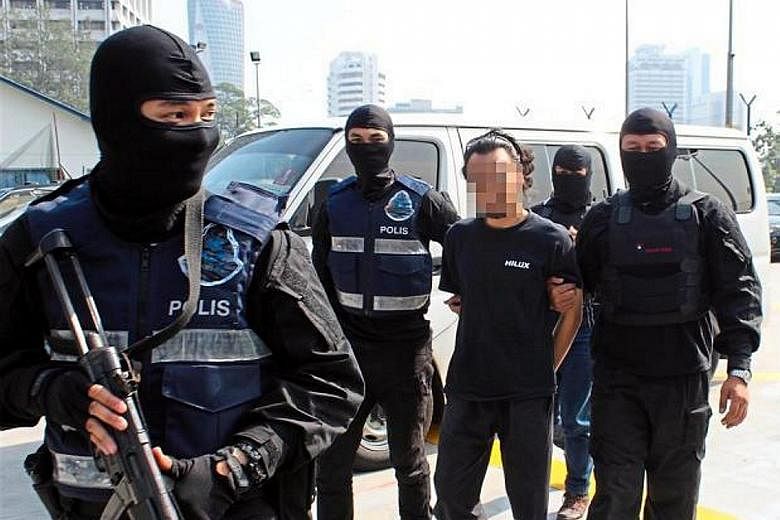Moving through cyberspace with no clearly defined face or structure, militant group Islamic State in Iraq and Syria (ISIS) represents a far more deadly threat to South-east Asia than Jemaah Islamiah (JI), intelligence officials and analysts say.
ISIS leaders and members come from diverse social and economic backgrounds and age groups, making profiling and detection difficult, unlike the South-east Asian group JI, which is linked to Al-Qaeda.
"When we arrest JI leaders, we can see who are the leaders, who are the members. But with ISIS, we cannot see the leaders or the members as they operate in cells," Malaysia's outgoing Special Branch director Akhil Bulat told The Straits Times this month in Jakarta where he received a bravery award for helping to cripple JI.
"ISIS is far more dangerous than JI," added Datuk Seri Akhil.
His colleague, counter-terrorism principal assistant director Ayub Khan, said most JI members come from religious schools and are in their early to late 30s.
"JI is much easier for police to detect as we can profile the members. With ISIS, they come from a diverse background. You cannot profile them.
"Some of them are as young as 12, 13, 17," Datuk Ayub told The Straits Times in Kuala Lumpur.
"It is not easy to enter into JI.
Recruits are carefully selected. They have to make the pledge of allegiance in front of their leader. With ISIS, you need to pledge allegiance only via the Internet," he added.
Among the 10 ISIS suspects that Malaysian police arrested last Wednesday was a 42-year-old civil servant who married her Syria-based militant husband via Skype.
Last year, a 27-year-old student from Limkokwing University in Selangor also married an ISIS fighter via Skype. She was arrested and then released as the police did not have enough evidence to charge her.
Both cases underscore the ISIS' relentless online presence and the danger it poses to the public as it tries to recruit men and women to join the fight in Iraq and Syria.
To prevent detection, Malaysian recruits avoid travelling directly to Turkey's capital Istanbul, a jump-off point for those joining ISIS. The Malaysians travel first to Jakarta or Bali and then to Istanbul and finally Syria, said Mr Ayub.
"If they were to go direct to Istanbul, it will catch our attention."
To date, 66 Malaysians are known to be in Syria. Another 121 have been arrested for suspected links with ISIS.
The Indonesians are employing the same tactics.
They travel from Jakarta to Kuala Lumpur where many buy their tickets to Istanbul.
Malaysia and Indonesia are sharing intelligence to stop the flow of recruits, but police say people still slip through.
"So far, we have deported 13 Indonesians (this year) back to Jakarta who were travelling to Syria from Kuala Lumpur," says Mr Ayub. No Malaysian has been deported from Jakarta.
Adding to the risks, Mr Akhil said, is Malaysia's political turmoil, with its Prime Minister embroiled in a financial scandal.
"It (ISIS) will take advantage of the weakness in our agencies as most of our intelligence agencies are bogged down with political issues... If we are not careful, there is a big possibility of bad elements, including ISIS, carrying out attacks."
Professor Bilveer Singh of the National University of Singapore concurs, saying the current divided political leadership in Malaysia gives ISIS a good opportunity to strike.
"ISIS operates like the Communist Party of Malaysia. The moment it spots a window of opportunity, it will penetrate and exploit it," he said.
"They (ISIS) have an excellent window with the political leadership divided so badly, (and) the intelligence, military and police agencies diverted and distracted.
"This is a good time to strike, partly as an opportunistic target, partly for revenge for all the ISIS arrests, and partly to respond to (Prime Minister) Najib Razak's 'moderate movement'," said Prof Singh.

